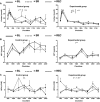Physiological and autonomic stress responses after prolonged sleep restriction and subsequent recovery sleep in healthy young men
- PMID: 29367834
- PMCID: PMC5754428
- DOI: 10.1007/s41105-017-0122-x
Physiological and autonomic stress responses after prolonged sleep restriction and subsequent recovery sleep in healthy young men
Abstract
Purpose: Sleep restriction is increasingly common and associated with the development of health problems. We investigated how the neuroendocrine stress systems respond to prolonged sleep restriction and subsequent recovery sleep in healthy young men.
Methods: After two baseline (BL) nights of 8 h time in bed (TIB), TIB was restricted to 4 h per night for five nights (sleep restriction, SR, n = 15), followed by three recovery nights (REC) of 8 h TIB, representing a busy workweek and a recovery weekend. The control group (n = 8) had 8 h TIB throughout the experiment. A variety of autonomic cardiovascular parameters, together with salivary neuropeptide Y (NPY) and cortisol levels, were assessed.
Results: In the control group, none of the parameters changed. In the experimental group, heart rate increased from 60 ± 1.8 beats per minute (bpm) at BL, to 63 ± 1.1 bpm after SR and further to 65 ± 1.8 bpm after REC. In addition, whole day low-frequency to-high frequency (LF/HF) power ratio of heart rate variability increased from 4.6 ± 0.4 at BL to 6.0 ± 0.6 after SR. Other parameters, including salivary NPY and cortisol levels, remained unaffected.
Conclusions: Increased heart rate and LF/HF power ratio are early signs of an increased sympathetic activity after prolonged sleep restriction. To reliably interpret the clinical significance of these early signs of physiological stress, a follow-up study would be needed to evaluate if the stress responses escalate and lead to more unfavourable reactions, such as elevated blood pressure and a subsequent elevated risk for cardiovascular health problems.
Keywords: Autonomic nervous system; Cortisol; HPA-axis; Heart rate variability; Sleep restriction.
Conflict of interest statement
Compliance with ethical standardsNone of the authors report any conflict of interest.The study design was approved by the ethics committee of Helsinki University Central Hospital.Written informed consent was obtained from all participants.
Figures



References
-
- Born J, Lange T, Hansen K, Molle M, Fehm HL. Effects of sleep and circadian rhythm on human circulating immune cells. J Immunol. 1997;158(9):4454–4464. - PubMed
LinkOut - more resources
Full Text Sources
Other Literature Sources
Research Materials
Miscellaneous
